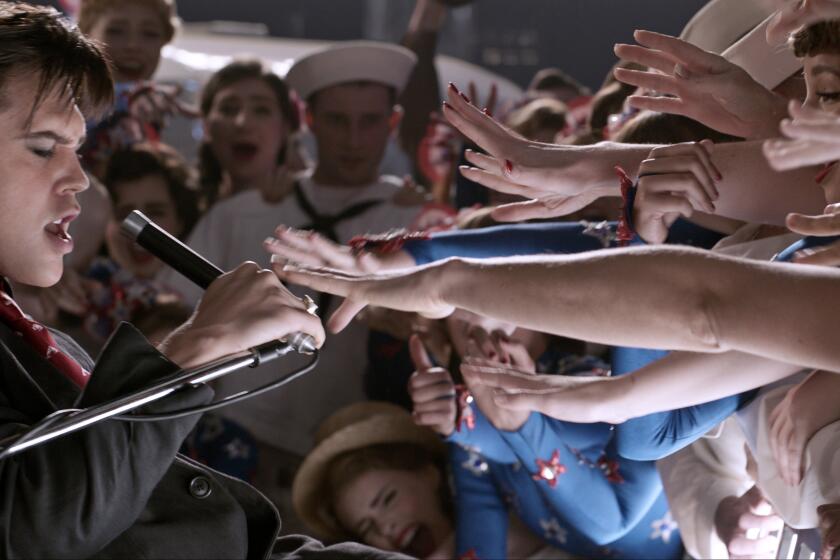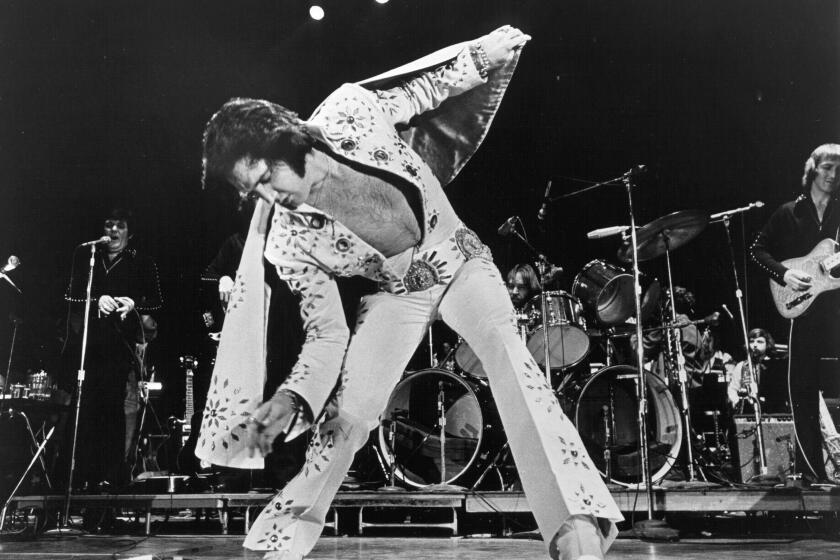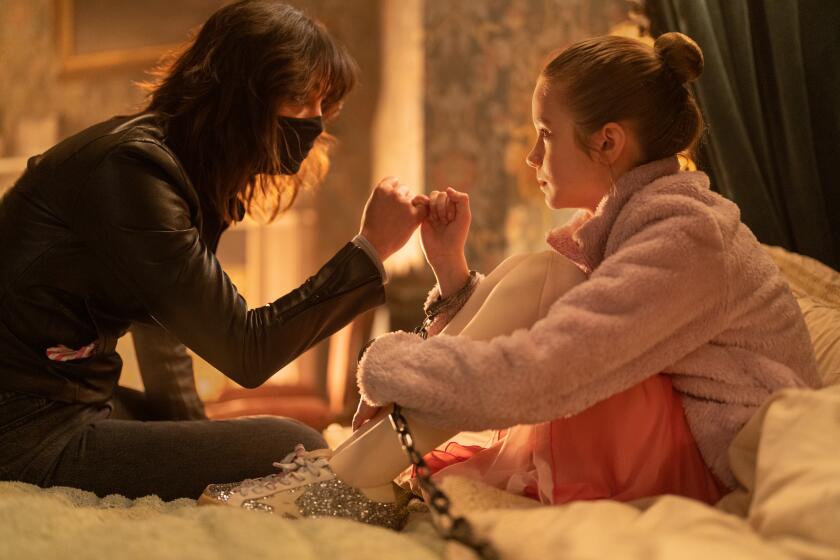Tom Hanks strikes out in ‘Elvis.’ It’s the rare misstep that illuminates a great career
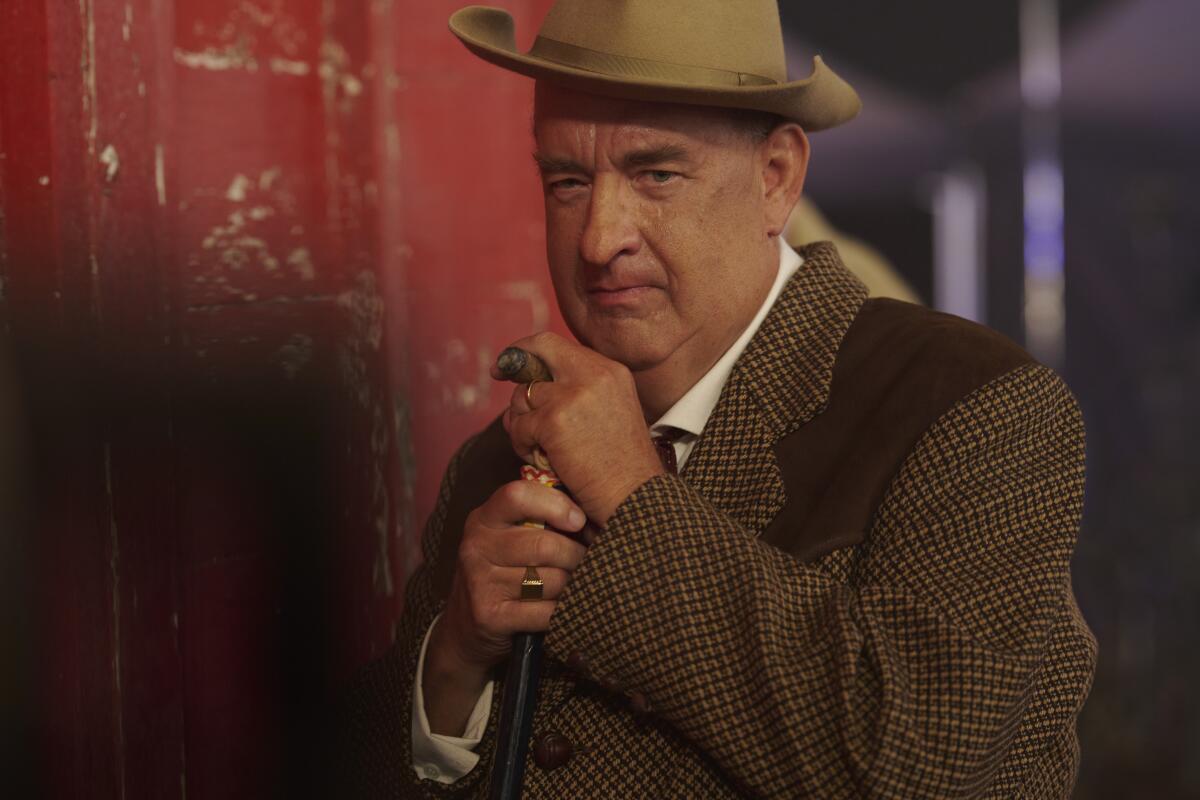
During the opening moments of “Elvis,” Baz Luhrmann’s razzle-dazzle romp through the life and music of Elvis Presley, I couldn’t stop staring at one actor in particular. I’d entered the theater knowing almost nothing about the movie or who was in it, and although I had some idea of whom I was looking at, I couldn’t be entirely sure. That’s not at all a common response to seeing Tom Hanks onscreen, but then, was this really Hanks, so familiar in countenance and yet so discomfiting in effect? Eventually, I had to conclude — reluctantly — that it was indeed him, emoting from beneath pounds of ruddy latex and jabbering in an overblown accent traceable to somewhere in the vicinity of the Netherlands.
The occasion for all this artifice is a relatively rare (for Hanks) display of onscreen villainy. He plays Col. Tom Parker, the Dutch-born carnival barker-turned-music impresario who managed and exploited Presley for years. History takes a dim view of the man, and so does “Elvis,” which topped the weekend box office and impishly casts Parker in the role of indignant, none-too-reliable narrator.
Indian action-musical extravaganza ‘RRR,’ French abortion drama ‘Happening’ and Hollywood Viking saga ‘The Northman’ are among the highlights of critic Justin Chang’s 2022 halftime report.
In swirling flashbacks, we see Parker cajoling Elvis (Austin Butler) into an exclusive contract, shaping the direction of his career and manipulating his image to suit the censors. Most egregiously, he traps Elvis in a seven-year Las Vegas hotel residency that will become an early grave, all so that Parker can pay off his gambling debts, fund his extravagant lifestyle and keep some personal skeletons in the closet.
This is an intriguingly off-center perspective from which to tell the story of one of the 20th century’s greatest entertainers. It also swiftly wears out its welcome and its insight. I try to steer clear of hyperbole, but since Luhrmann’s filmmaking is nothing if not hyperbolic, an exception seems fitting: Offhand, I can’t remember Hanks delivering a more grating, more voraciously attention-grabbing performance than the one he gives here. And that’s a shame, because when the camera isn’t on him — when it turns the spotlight on its ostensible subject and lets the music, the lighting and the rhinestone-studded production design seize hold — “Elvis” does become something grander than its missteps. The passion and energy of Butler’s performance come into focus, and the flamboyant excesses of Luhrmann’s filmmaking merge, rousingly, with Presley’s own.
Austin Butler poured everything he had into playing Elvis. The actor shares the grief, music and obsessive research that went into his portrayal.
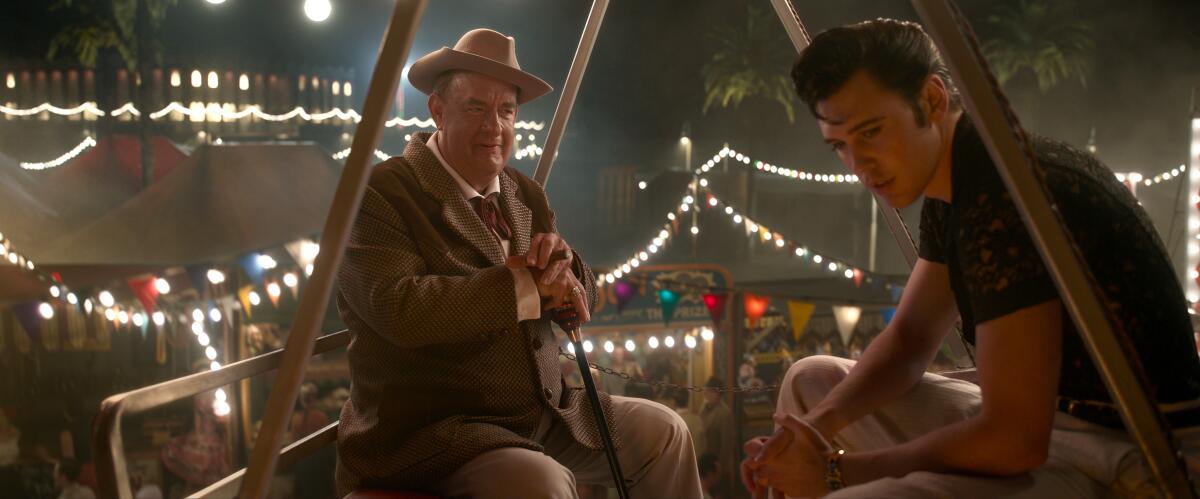
If the tragedy of Elvis the man is that he never breaks free of Parker, the tragedy of “Elvis” the movie is that it never does either. Even as it villainizes Parker (who protests, unconvincingly, that he’s not really a villain), Luhrmann’s film proves curiously indulgent of him and of Hanks’ overweening performance. It doesn’t help that sticking any actor in a fat suit and burying them with unflattering prosthetics has become one of Hollywood’s lazier clichés, whether the character in question is a Batman villain or a historical figure.
And Hanks, who’s made unvarnished, down-to-earth honesty something of a career specialty, feels uniquely ill served by such gimmickry. It’s a rare miscalculation, I think, from a star who’s done some of his finest, most interesting and often unheralded work over the last decade, to the point where he seems in genuine danger of being underappreciated.
In other words, I come to praise Tom Hanks, not bury him. I’m even notionally sympathetic to the idea that his “Elvis” performance works in context, that it makes you recoil to exactly the degree that it should. Of course he comes across as a malignant parasitic growth, because that’s exactly what Parker was. Some might even conclude that Hanks’ fabled onscreen decency is deployed and undermined in a productively subversive way; perhaps we’re meant to look upon Parker and see, trapped beneath all those sneering pancake layers, a kernel of relatable Hanksian humanity. (I am consciously avoiding the word “everyman,” a go-to Hanks descriptor that, as my Times colleague Mary McNamara has persuasively argued, has become reductive to the point of meaninglessness.)

One thing’s for certain: Parker is not the kind of character we often associate with Tom Hanks, and I suspect that’s partly why he wanted to play him. If Hanks has long been aware of the blessings and limitations of an unshakable nice-guy persona (“I’m not a chameleon,” he said in a 1992 Times interview, with the debacle of “The Bonfire of the Vanities” not too far behind him), he has also showed, over the years, a gentle refusal to let that persona define him.
Playing the bad guy has never come naturally to Hanks, though it could be rewarding to see him try, whether he was embodying the noblest of a bad lot in the 2002 gangster melodrama “Road to Perdition” or delivering unctuous comic villainy in the Coen brothers’ “The Ladykillers” (2004). In the context of a career often overshadowed by flattering if reductive comparisons to Jimmy Stewart, a wild swing like Col. Parker, love him or hate him, makes a kind of sense.
And there is precedent in Hanks’ career for both Parker’s over-the-top wickedness and Luhrmann’s prosthetic-laden artifice. In a way, this Parker might make more sense popping up in “Cloud Atlas” (2012), in which Hanks (like many of his co-stars) played six different characters, differentiated by wigs, noses, accents, languages, vocal inflections and other gaudy externals. The performances, like the movie itself, are a mixed but ambitious bag, and at their best they suggest something of what must have drawn Hanks to Hollywood in the first place: not the chance to play paragons of working-class virtue, but rather a sense of acting as play, as a form of liberating, exhilarating make-believe.
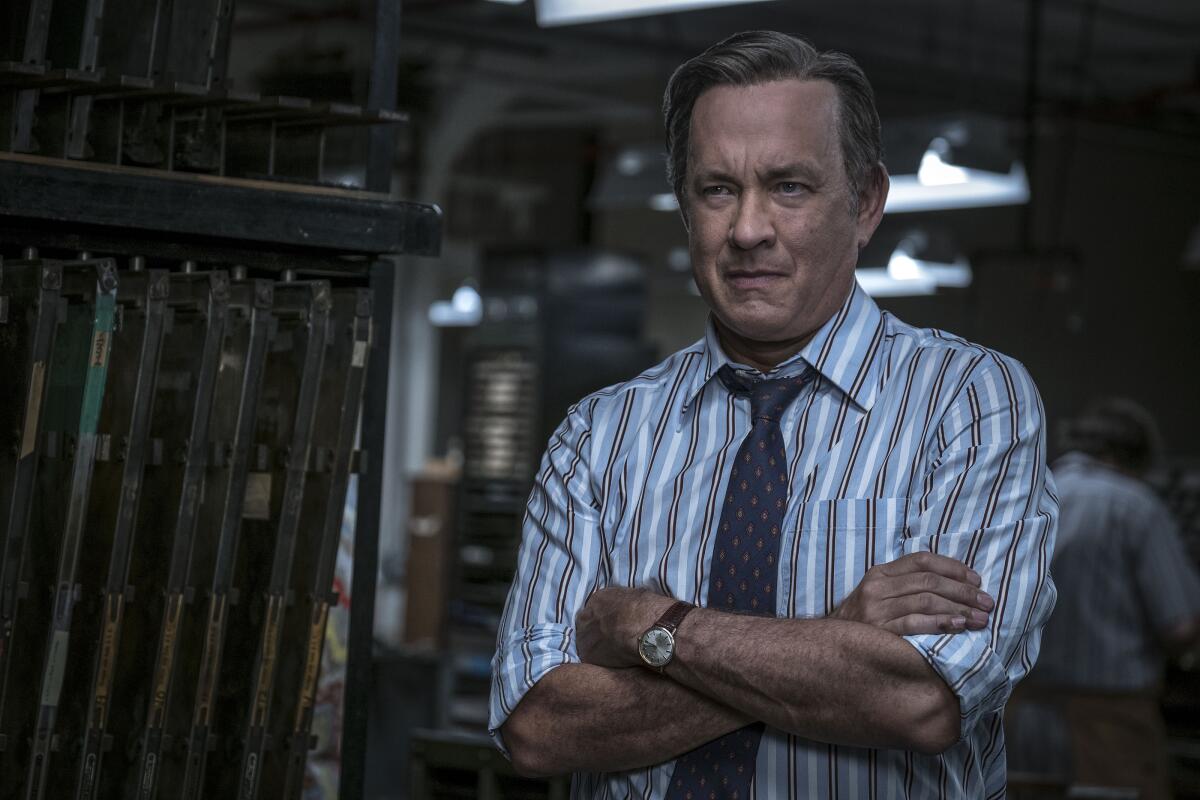
But while Parker is very much a larger-than-life figure, a glowering antagonist in a movie that, like many Luhrmann epics, has been conceived along the lines of a fairy tale, he is also drawn from the pages of American history.
So, for that matter, are a lot of memorable Hanks characters from the last decade, even if most of them earn your admiration rather than your disgust. I’m thinking especially of Capt. Richard Phillips in “Captain Phillips” (2013) and Capt. Chesley “Sully” Sullenberger in “Sully” (2016), a sea captain and an airline pilot, respectively, called on to demonstrate quick thinking and extraordinary courage under treacherous circumstances.
Austin Butler plays the King of Rock ‘n’ Roll and Tom Hanks plays his ruthless manager in the Cannes-premiered biopic.
So what?, you might think: Hanks is good at playing heroes and arguably has played too many of them. But he has also become remarkably skilled, I would suggest, at stripping the veneer off heroism and even complicating what we think of as heroic.
That’s especially true in “Captain Phillips,” in which Hanks gives what may be the most intensely realistic and emotionally shattering performance of his career. For much of the movie, his Capt. Phillips is reacting, with shot nerves and barely concealed panic, to a horrific disaster. His final scene is one of the great emotional releases in recent American movies, in which Hanks lays bare, with finally unrestrained anguish and violent, body-racking sobs, a level of raw vulnerability that too few of our leading men allow themselves. It’s a brave acknowledgment that not all wounds heal, certainly not right away.
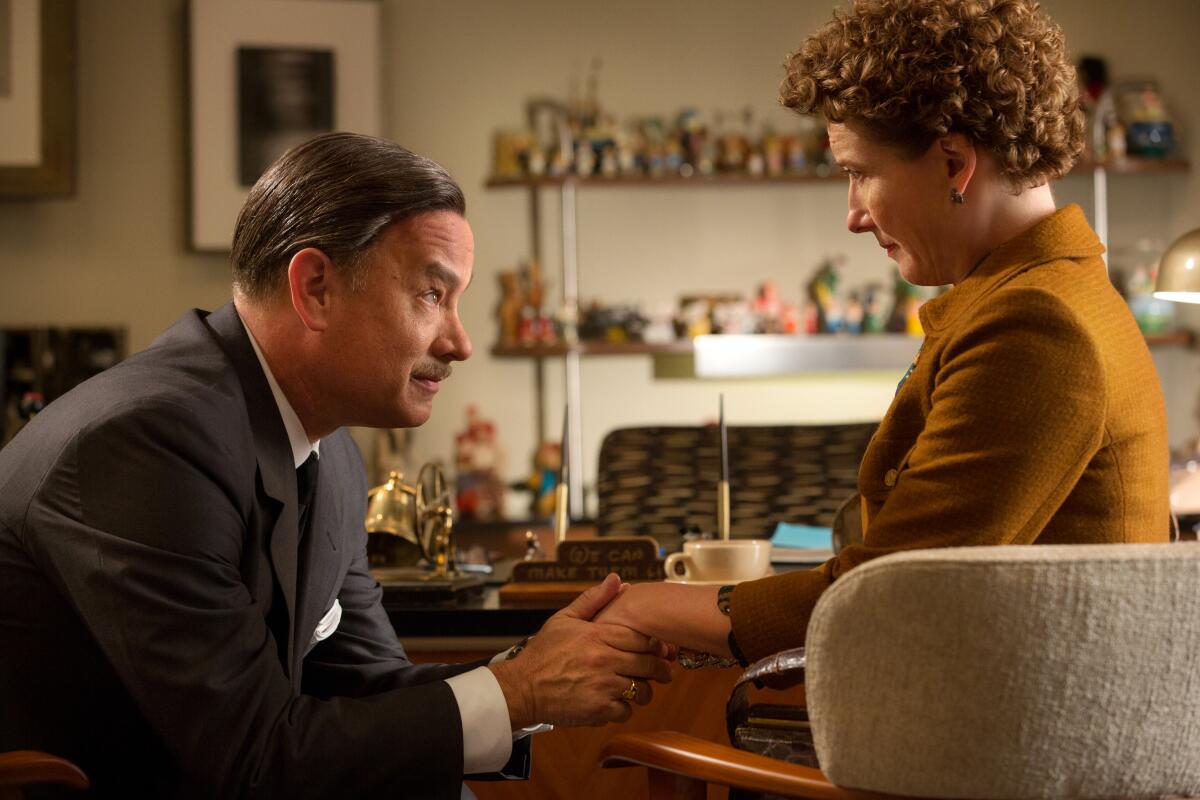
Paul Greengrass, the director of “Captain Phillips,” cast Hanks as a different kind of captain in a more classically crowd-pleasing key in the 2020 western “News of the World.” His character, Capt. Jefferson Kyle Kidd, also happens to be inspired by a real-life person, though his grizzled determination and self-sacrificing nobility are pure essence of Hanks. This kind of stolid American decency comes easily to him.
So perhaps does his fine recent work with longtime collaborator Steven Spielberg in the historical dramas “Bridge of Spies” (2015) and “The Post” (2017). You believe Hanks completely as both shrewd diplomatic lawyer James B. Donovan and tenacious Washington Post editor Ben Bradlee — two men who drew on their influence, intelligence and considerable integrity to shape crucial chapters of postwar history. But you are not, perhaps, terribly surprised to see him pull either one off.
Two of my favorite Hanks performances from the last decade — as Walt Disney in “Saving Mr. Banks” (2013) and as Fred Rogers in “A Beautiful Day in the Neighborhood” (2019) — strike me as bolder, nervier gambits. In both films, he is playing a beloved children’s entertainer, and in both films he hints at the darker, more complicated underpinnings of a media personality.
This admittedly isn’t hard to do in the case of Disney, a figure nearly as polarizing as the empire he founded. But in “Saving Mr. Banks,” Hanks delicately suggests the cool calculation beneath a warm-and-twinkly Uncle Walt surface, building to a climactic monologue about the therapeutic power of stories that can be read as chilling or heartwarming, or both. In this moment, Hanks, his pupils shrinking to dark little beads, seems to melt into his real-life subject with an eeriness I’ve seen few actors manage.
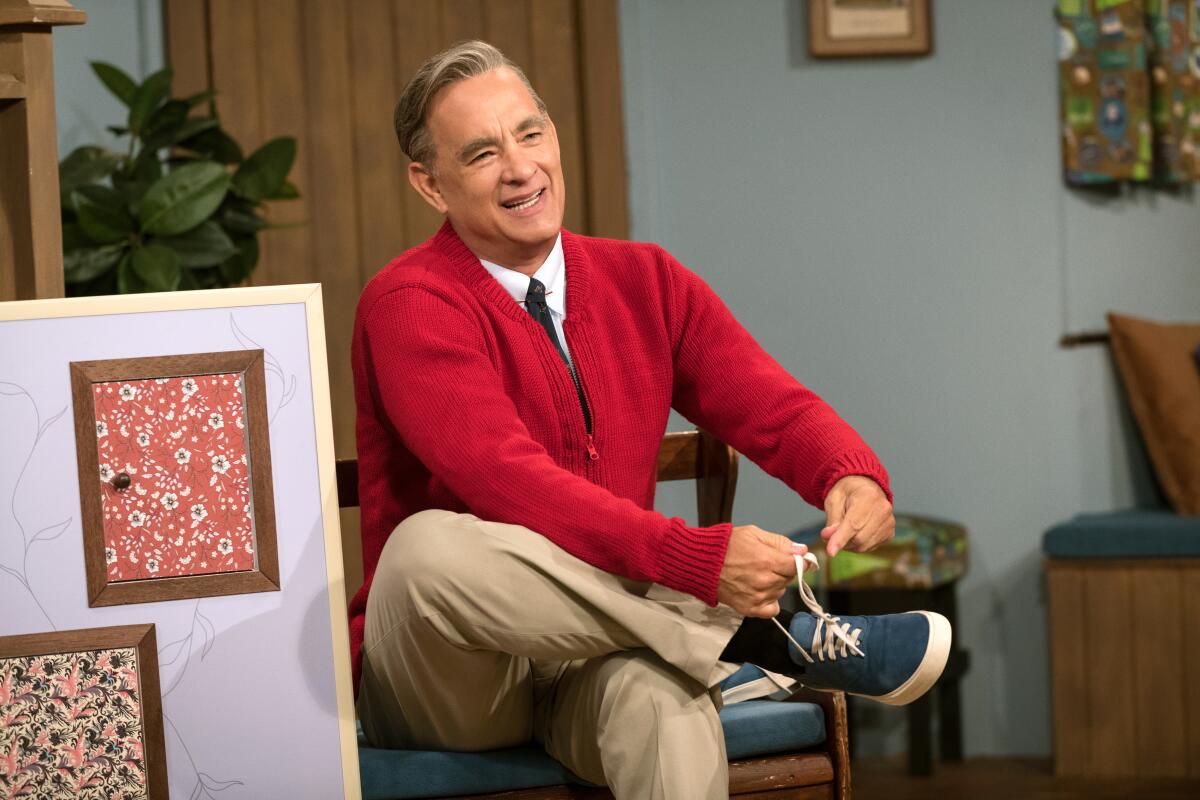
I don’t know if a similar transformation takes place in “A Beautiful Day in the Neighborhood,” but in Marielle Heller’s exquisite not-quite biopic, the depth of Hanks’ performance goes beyond any imitation of Mr. Rogers’ signature mannerisms. Hanks may wear a red cardigan and speak in a slow, unhurried drawl, but what he brings to the role is a whispery suggestion of inner complexity — the sense that Rogers’ deep and unassailable goodness was not a saint’s birthright but rather the product of intense spiritual discipline. This Rogers, beloved as he is, doesn’t fit snugly into Hanks’ gallery of heroes. His singularity defies categorization, and so does Hanks’ interpretation.
“A Beautiful Day in the Neighborhood” earned Hanks his sixth career Oscar nomination — his first in the nearly two decades since “Cast Away” (2000) and his first as a supporting actor rather than a lead. That alone might seem to tell a story about an actor whose stardom has been sidelined over the years, whose particular talents no longer speak to audiences (or at least awards voters) as compellingly as they used to.
Of course, the likelier reality is that the motion picture academy, surprise surprise, gets it wrong more often than not and that Hanks, like all actors blessed with the gift of longevity, has become a far greater, subtler actor with time. “Elvis,” it’s true, may not be Exhibit A in this argument. But it may be the garish, ill-advised, weirdly mesmerizing exception that proves the rule.
Baz Luhrmann’s splashy “Elvis” biopic attempts to make the King relevant to a new generation. But 50 years after Presley’s last Top 10 hit, is it too late?
More to Read
Only good movies
Get the Indie Focus newsletter, Mark Olsen's weekly guide to the world of cinema.
You may occasionally receive promotional content from the Los Angeles Times.


